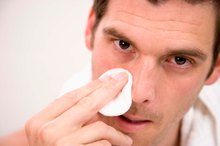How to Treat Nose Bleeds With Blood Thinners
Blood thinners are often prescribed to reduce the risk of stroke, arterial blockages and heart attacks or to prevent blood clots from forming or thickening. Nose bleeds are a common occurrence for those on blood thinning medication and can be problematic if not treated properly. If you are experiencing frequent nose bleeds, you may want to contact your doctor about adjusting your medication dose or to have a problematic blood vessel cauterized in the nose if it is responsible for the problem. He may also be able to equip your nose with specialize gauze or insert an inflatable balloon to help stop the bleeding.
Reduce your blood pressure when experiencing a nose bleed by positioning yourself upright in a chair and tilting you head forward. An upright position will take the pressure off of the nose veins and by leaning forward you can reduce the amount of blood swallowed during the time you are bleeding.
Children With Nosebleeds at Night
Learn More
Position your thumb and index finger over your nose and squeeze, holding it tight for 5 to 10 minutes to put pressure on the nasal septum, which can help lessen the blood flow.
Check to see if the blood flow has stopped after ten minutes, if not, pinch your nose closed for an additional 10 minutes to stop the flow. Apply an ice pack to cheeks and nose area while holding your nose closed.
How to Care for Your Broken Nose
Learn More
Avoid strenuous exercise for 12 hours after you experience a nose bleed. Try not to bend over for several hours following an episode and avoid blowing your nose or picking at it which can rupture the clot.
Call your doctor if the bleeding occurs for longer than 30 minutes when applying direct pressure to the nose. If the bleeding stops and then starts up again, blow the nose forcefully to clear it of any clots, apply a decongestant nasal spray and pinch the nose closed again. Report your symptoms to a physician.
Tips
Water-based lubricants sprayed into the nose can help for those who are using supplemental oxygen or who suffer from dry nose or allergies. Use a humidifier to keep the air moist in your home, especially if you live in a dry climate.
Avoid regular use of antihistamines, which can cause nasal drying and promote bleeding.
Warnings
Excessive blood flow down the back of your throat while clamping the nose shut may indicate a burst vessel in the higher nasal septum.
Related Articles
References
Resources
Writer Bio
Abaigeal Quinn works as an international entertainment broker in the United States. She is a former news editor and insurance agent who began writing for a daily newspaper in 1995.









